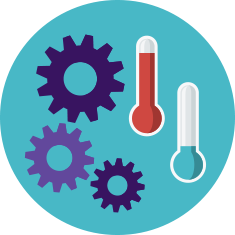Your air conditioner should be cooling your home—not leaking water onto your floors. If you’ve noticed water pooling around your unit, don’t ignore it. A leaking AC isn’t normal and can signal a problem that needs immediate attention to prevent further damage.
So, what causes air conditioners to leak? Below, we’ll cover the most common reasons your AC might be dripping water, what to do if you spot a leak, and how to help prevent future issues with routine maintenance.
Reasons Why an AC Can Leak
Clogged Drainage System
A blocked pipe or condensate pump can prevent proper water flow. Debris, dust, and mold buildup are often the culprits behind these obstructions. When left unaddressed, this can lead to water damage in ceilings, floors, or even the basement.
Cracked or Rusted Drain Pan
A rusted drain pan may develop holes over time, allowing water to escape instead of draining properly. When this happens, moisture begins to pool around the AC unit.
Refrigerant Issues Lowering Pressure
A low refrigerant level reduces pressure in the system, which may cause the evaporator coil to freeze. When the ice melts, excess water drips and creates a noticeable leak. Fluctuations in temperature due to improper refrigerant levels can strain the compressor.
Dirty Air Filter Blocking Airflow
A clogged air filter restricts airflow, which can drop the evaporator coil’s temperature to freezing levels. This may cause ice to form and eventually melt. Replacing the air filter regularly helps stabilize air circulation.
Float Switch Failure
The float switch is designed to shut off the system if water overflows. A faulty switch may not activate, allowing a leak to go undetected for long periods. This malfunction often results in severe mold and rust accumulation.
What to Do if Your AC Leaks
Turn Off the Thermostat Immediately
Stopping the system prevents further damage and gives time to assess the situation safely. Continued operation may increase moisture buildup or short-circuit components. This step is crucial before inspecting internal parts like the evaporator or duct system.
Inspect the Condensate Pump and Drainage Line
Examine the pipe for clogs and confirm that the condensate pump is functioning properly. Using a vacuum to remove blockage can restore normal flow. If water continues to collect, it might indicate deeper mechanical issues.
Check for Ice Around the Evaporator Coil
Excessive ice formation signals a problem with temperature regulation or airflow. Allow the unit to thaw completely before restarting to avoid further freezing. During this process, monitor any new signs of leaking or water pooling.
Look for Signs of Mold or Water Damage
Moisture that accumulates over time often leads to mold and stains on walls or ceilings. Detecting early signs of water damage helps prevent more costly repairs. It’s also important to check areas like the basement where unnoticed leaks might spread.
Call a Professional for High-Pressure Issues
If refrigerant levels are low or the system shows signs of high pressure, contact a certified technician. These problems can damage the condenser, compressor, or other sealed components. Attempting DIY repairs on pressurized parts isn’t safe and can potentially lead to worse problems if you don’t know what you’re doing.
How to Prevent Your AC From Leaking
Schedule Regular Maintenance
Routine maintenance helps detect potential issues before they become major leaks. Technicians clean internal components, test the float switch, and measure refrigerant levels. Through maintenance, you can maintain system efficiency and prevent freezing or clogging.
Clean or Replace the Air Filter Monthly
A fresh air filter maintains strong airflow and consistent temperature control. It prevents dust and debris from clogging the evaporator or drainage system. Keeping airflow stable also reduces strain on the thermostat and compressor.
Seal Duct Leaks and Remove Rust
Loose ductwork can allow moisture to escape, which causes localized condensation and mold. Sealing gaps and treating rust helps maintain optimal temperature and prevent further corrosion. This step also protects against air loss and pressure imbalances.
Use a Float Switch and Test It Regularly
This small device can stop a leak before it causes major damage. It plays a vital role in stopping overflows from unnoticed drainage issues, so make sure to have it tested routinely.
If You Have an AC Problem, Reach Out to Wendler Heating & Cooling
There’s no need to worry about air conditioner problems when we’re around! Wendler Heating & Cooling offers professional AC repairs in Conshohocken to address leaks and other problems, as well as air conditioner maintenance to lower the chances of future problems.
Get in touch with our team today to learn more and schedule an appointment for your home!


